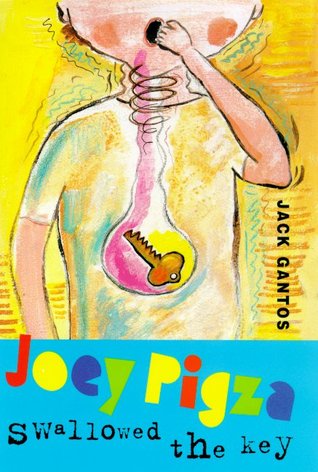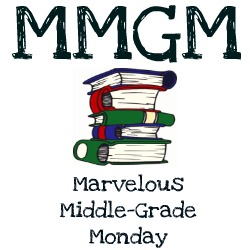I was of two minds over whether to spotlight this story. Â On the one hand, I really enjoyed several aspects of it, and felt it benefited me as a reader. Â On the other hand, I could barely make myself keep reading it at times, and am not 100% positive if it would actually benefit your average middle school-aged reader. Â In the end, I decided to throw a spotlight on it anyway, and let you, my wise readers, decide what you think.
Here we have it–Joey Pigza Swallowed the Key:
Right off the bat, you can see what two of the book’s great strengths are. Â First, that the main character, Joey, is highly sympathetic. Â How could he not be? Â He has the last name of Pigza! Â Can you even imagine what playground children could do with that name? *shudder* Â Joey is in fact so sympathetic that it created one of my problems, because I felt so bad for him and his struggles in his (apparently) impossible situation that I almost couldn’t keep reading! Â We are very much there, inside his head, and experiencing his day exactly as he does. Â More on that in a bit.
Secondly, doesn’t the phrase ‘Joey Pigza Swallowed the Key’ just ring with fascinating promise? Â It immediately reflects one of the crunch points in the book’s plot development, and does so in a way that summarizes all of Joey’s problems. Â Lots of kids might play with their house key, tied to a ribbon, by putting it in their mouth. Â Some kids would probably contemplate swallowing it, and might have a discussion with their gag reflex on the advisability of doing so. Â A few might even accidentally swallow it. Â Very few–the Joey Pigza’s of the world–would repeatedly swallow their key over and over, pulling it back up by the ribbon each time, so they could show off their awesome new super power. Â Kids like that…we all know odds are very good they’ll have a tough time in school. Â When they’re also super wired, like Joey, and working against a stacked deck in their home environment, everyone’s going to need an aspirin.
And, that hints to both the reason I had to spotlight this book, and one of the reasons I hesitated. Â Joey’s journey was inspiring, and I loved that the turning point that helped him head in a positive direction came as a direct result of his having hit rock bottom. Â I also really, really appreciated this look inside Joey’s head. Â It’s so easy for adults, or for anyone who’s never experienced certain struggles, to feel we know what someone else ought to be capable of. Â To think we can guess what’s going on inside that little head. Â This kind of mentality has always driven me nuts, but I’ve been guilty of it myself. Â So, we need books like this, that serve as an eye-opener and give us a glimpse into a foreign world. Â However, the book also represents special-ed and the special-ed students in a way that made me cringe in horror. Â Being placed in that classroom (and center) is the threat used on Joey in the hopes that it’ll motivate him to shape up. Â And I don’t think that’s unrealistic. Â No, it’s not how modern-day education is supposed to work, but we all know what’s supposed to happen doesn’t always. Â There’s also often the feel that the book may not be 100% current. Â So, while unfortunate, I can see that. Â I do worry about it’s impact on young readers, though. Â So many kids in wheelchairs, etc., have worked so hard to be seen, to be noticed, and to be known as ‘regular’ kids in extraordinary trappings. Â It’s an ongoing battle, and one I’m grateful campaigns like #weneeddiversebooks help to draw attention to. Â But, while this book provides insights into the world of ADD kids and students with ‘problem’ behavior, it felt to me like a definite step backwards for the kids in special-ed. Â So, a tricky compromise.
Let’s see what Apricot-kitty thought of it:
 “I have just one word: ick. Â We cats are accused of many things humans find distasteful–much of it wrongly so…our tongues are designed for washing! Â But no cat has ever intentionally swallowed a key. Â Nor would we make the colossal miscalculation of thinking a hay stack was soft when it quite patently isn’t. Â This book made my fur fluff up the wrong way. Â Seriously, just–ick.”
“I have just one word: ick. Â We cats are accused of many things humans find distasteful–much of it wrongly so…our tongues are designed for washing! Â But no cat has ever intentionally swallowed a key. Â Nor would we make the colossal miscalculation of thinking a hay stack was soft when it quite patently isn’t. Â This book made my fur fluff up the wrong way. Â Seriously, just–ick.”
I guess that means she tilted the other way? Â No doubt there will be some that do. Â As I said above, I can’t give this book my kick-it-round-the-moon unadulterated approval. Â But, I think most readers would be better off for having read it, especially if that’s followed by a little discussion. Â If you read it (or have read it) let me know what you think, I’d love to hear about it!
For more Marvelous Middle Grade Monday spotlights, reviews, interviews and giveaways, stop by Shannon Messenger’s blog, and happy reading!


Sandy Brehl
Greg Pattridge
Suzanne Warr
Joanne Fritz
Jenni Enzor
Suzanne Warr